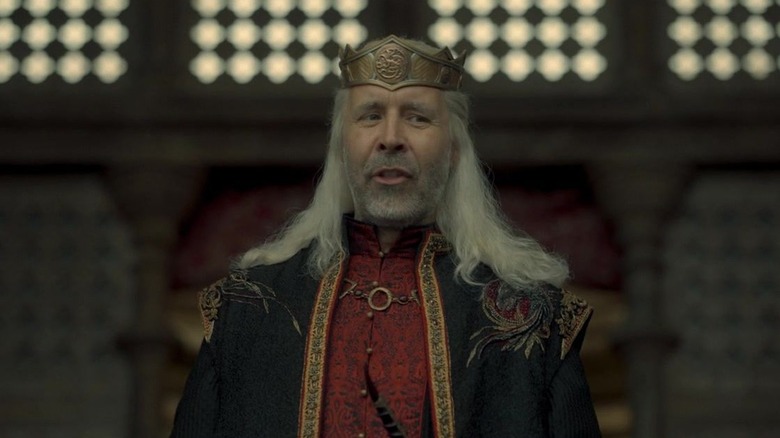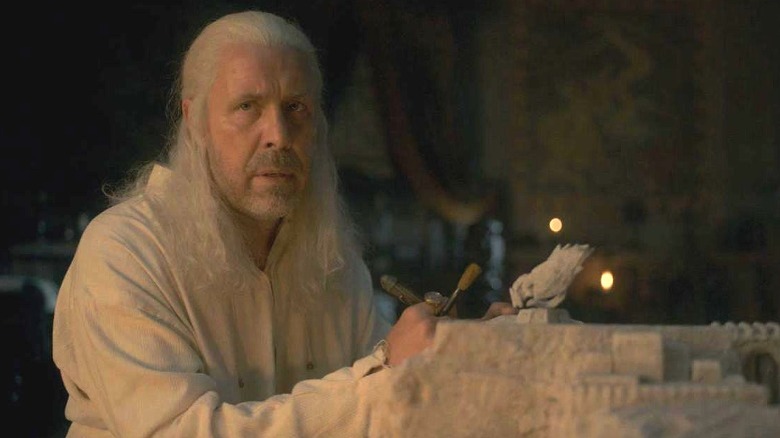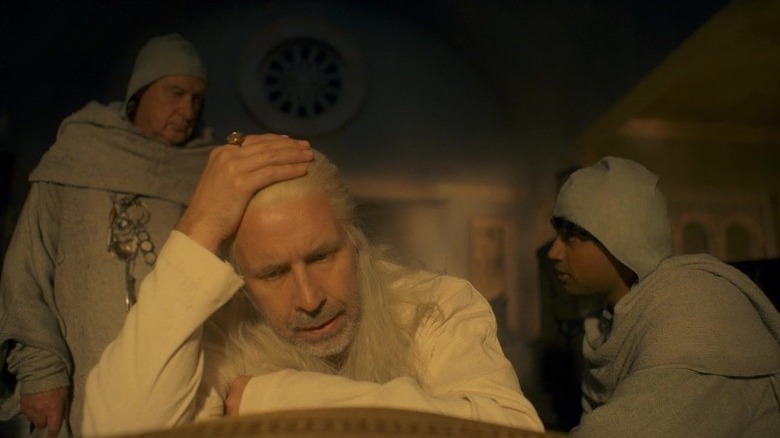House Of The Dragon Star Paddy Considine Thinks He Knows Why Fans Were Initially Put Off By King Viserys
Among the many elements that made HBO's "Game of Thrones" the revolutionary, unprecedented cultural phenomenon that it was, one could single out the fact that it gave the world a host of truly iconic characters as one of the most important. The show's character roster comprises men and women who, by rare combinations of personality, development, narrative positioning, and performance, managed to enthrall audiences around the world enough to make their stories appointment viewing.
That was always the big bar to clear when it came to "House of the Dragon" and the astronomical expectations it inherited from its parent show. But in the end, the Targaryen-focused prequel series turned out to be a critical and audience hit nearly on par with "Game of Thrones" itself, which goes to show that its cast of characters has proven just as captivating in its own way. The fervent, warring fandoms of Rhaenyra Targaryen (Emma D'Arcy) and Alicent Hightower (Olivia Cooke) speak for themselves, but even setting aside the show's pivotal conflict of matriarchs, the bench of interesting players on "House of the Dragon" is a deep one. There's Matt Smith's startlingly brash Prince Daemon Targaryen, Sonoya Mizuno's ever-unpredictable Mysaria, Rhys Ifans as the quietly Machiavellian Otto Hightower, and Eve Best as the show's secret MVP, Rhaenys Targaryen. And then there's the cast's first-billed name, Paddy Considine, as King Viserys Targaryen. A radically unusual character in many ways for the "Game of Thrones" universe, King Viserys initially sparked the rage and antipathy of many fans — and Considine has a theory that all this ire directed at the character is because of how he defied fan expectations.
King Viserys is not your typical Game of Thrones monarch
Although Paddy Considine's brilliant performance and the show's patient, rewarding storytelling eventually allowed King Viserys I Targaryen to find a way into fans' hearts, the character was a controversial one at first. Despite being one of precious few characters on "House of the Dragon" who could be described as genuinely pleasant and likable, Viserys' reticence, conflict avoidance, and general eagerness to please added up to what many "House of the Dragon" fans saw as an unfit, unhelpful monarch. In a cast interview with Deadline, Considine revealed that he was fully aware of that initial controversy and confessed to being taken aback by the fan hate at the time.
"I was sort of shocked in the first episode or so when people commented that they hated him," the English actor told Deadline. But then, he went on to speculate that the reason why a character like Viserys could be the object of such hostility is because he defied expectations. "I don't think that fans were used to a character like that in that world, a king who wasn't corrupted by power or entitlement. I think it was difficult for people to place him because he wasn't particularly archetypal and he wasn't what they were expecting from what they'd read in the books, either," Considine told Deadline. And as a matter of fact, that theory is corroborated by the words of "House of the Dragon" co-creator Ryan Condal himself.
The show's Viserys was conceived as a modern politician in a feudal world
Although the Deadline "House of the Dragon" cast interview feature did not include interviews with the show's writers due to the ongoing WGA strike, it did quote comments made by co-creator and co-showrunner Ryan Condal during Deadline's earlier 2023 "Contenders" event. In one of those comments, Condal provided helpful context for King Viserys' characterization throughout Season 1, in a way that dovetails with Paddy Considine's thoughts about the audience response to the character.
According to Condal, the game plan was very much for Viserys to be a jarring, offbeat presence — "a really good man but ... not a good king," as the writer and executive producer put it. The reason Viserys would not be a good king? Call it a matter of historical timing. "[He's] actually quite a modern politician. He's not quick to move. He takes consensus. He finds the middle often. Those aren't qualities that work in a feudal medieval society. They are things we look for in our contemporary leaders," Condal pointed out, going on to add that there was a kind of weakness to Viserys' demeanor in that way. As any fan of the flagship HBO fantasy series will recall, of course, "Game of Thrones" ended with the characters scoffing at the suggestion of a transition to contemporary democracy, even 173 years after King Viserys I's death. It seems like the poor man might have just been born in the wrong millennium.


